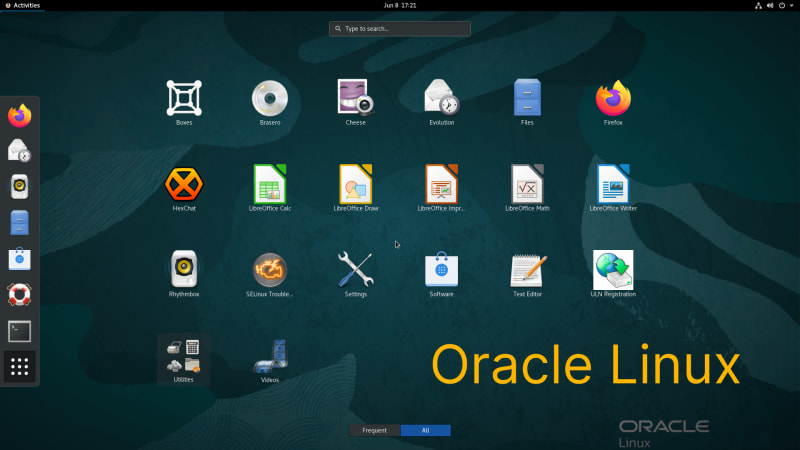In the world of Linux servers, the Red Hat family is the most favored and widely used series. Started with Red Hat and then was cloned into different distributions.
CentOS was the most popular and used free Red Hat clone distribution. Before Red Hat acquired it and transformed it into CentOS Stream.
Rocky and AlmaLinux are emerging distributions that gained popularity as alternatives to CentOS. There are aims for offering a consistent target like the previous CentOS.
But, in the Red Hat family, there is a version that is a little less used and recognized: Oracle Linux.
I will briefly introduce Oracle Linux in this article.
Who created Oracle Linux?
As the name suggests, Oracle Linux is released by the well-known company Oracle. It is also known as Oracle Enterprise Linux or OEL.
Is Oracle Linux Free?
Yes, you do not need to pay to use Oracle Linux.
But, it also offers commercial extended support. You can purchase paid services.
Is It a clone of Red Hat?
Yes. It is a Linux distribution built by recompiling the source code of Red Hat.
But, it differs from CentOS because it is not simply a clone of RHEL but enhances it.
Oracle is a giant with powerful capabilities in technology. So Oracle Linux is not just simply cloned RHEL but made many improvements.
For example, Ksplice allows kernel updates without reboot. It is provided in Oracle Linux. There are many enhancements like Ksplice in Oracle Linux.
Furthermore, Oracle Linux offers two different versions: RHCK and UEK.
RHCK and UEK
Oracle provides two different versions.
Red Hat Compatible Kernel (RHCK)
This version uses the same kernel as Red Hat. It is similar to the CentOS distribution series. Since it uses the same kernel as RHEL, its stability, and compatibility are guaranteed.
Unbreakable Enterprise Kernel (UEK)
UEK is shipped with an up-to-date mainstream kernel. And includes many enhancements created by Oracle, such as RDS, async I/O, OCFS2, and networking.
Different with RHCK, UEK is an enhancement version of REHL
Although it delivers different kernels, Oracle still promises 100% compatibility with RHEL.
5. Advantages of Oracle Linux
Oracle Linux has its unique advantages when compared with Others.
Reliable compatibility with Oracle products
While it may not be as popular as CentOS etc, Oracle Linux is widely used within the company for many of its products. For example, Oracle Cloud uses Oracle Linux.
Other Oracle products that run more reliably on Oracle Linux include:
Oracle Exadata
Oracle Private Cloud Appliance
Oracle Big Data Appliance
Oracle Exalytics
Oracle Database Appliance
Choosing Oracle Linux is an excellent option if you are using Oracle products.
Strong technical support from Oracle
Oracle Linux is not just simply a clone of RHEL, it added many enhancements.
Oracle Linux has made significant improvements. Also with strong integration with many Oracle products. This makes Oracle Linux a reliable and distinctive Linux distribution.
Especially if you are using Oracle products, Oracle Linux is more reliable.
Better compatibility with specific hardware
Oracle Linux provides better compatibility and support for many hardware.
Oracle Linux was certified with many hardware, including IBM, Dell, Lenovo, Cisco, etc.
Additionally, Oracle/Sun hardware servers often come bundled with Oracle Linux by default.
6. Disadvantages of Oracle Linux
Oracle Linux is not as popular as CentOS except in its own ecosystem.
It has some disadvantages that make it less popular compared to CentOS/Rocky Linux.
Poor reputation in the open-source community
Well, this is a significant disadvantage.
Linux is an operating system that is closely associated with the open-source community.
But Oracle's reputation in the open-source world is quite poor.
Most companies will choose RHEL for paid options and CentOS/Rocky Linux for free options.
Except for using Oracle products, there is no special reason to choose Oracle Linux.
It is a cloned and enhanced version
Oracle Linux has made significant enhancements and improvements thanks to Oracle's strong ablity.
But it is still a cloned version of RHEL. And made some changes based on it.
So, When Oralce Linux Compared with RHEL, RHEL is still considered more reliable.
Less contribution, Less community support.
Oracle Linux benefits from open source as others.
But it contributes much less to the Linux kernel compared to Red Hat and Ubuntu, etc.
So Oracle does not have strong community support as CentOS and others.
8. Is Oracle Linux Suitable For you?
It is clear that Oracle Linux is suitable for the following groups:
You are using Using Oracle Cloud or Oracle's own products
Purchasing Oracle hardware servers, which often come bundled with Oracle Linux
Having a close relationship with Oracle
If you are a member of a group in the above, Oracle Linux is a better choice for you.
Otherwise, RHEL or Rocky Linux is more suitable for you.




Top comments (1)
Having a "close relationship" with Oracle is like being buddies with a Nile Crocodile.
As for being the "most favored", it seems to have lost that at least with the fed back in the summer of 2021, though I am not sure why. Federal contractors that did not or could not migrate their products or services off RHEL found their contract awards cancelled (unheard of) and at least some actually went under. Agencies that used to be exclusively RHEL and now seem to only want Ubuntu for new products and services include the DOD (bices), DHS, and the NGIA. At least those I have seen first-hand. I have found no reason to boot or use RHEL/CentOS since 2021 as nobody seems to now want things deployed with it.